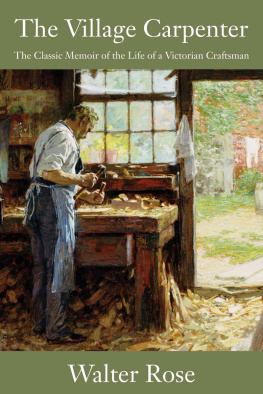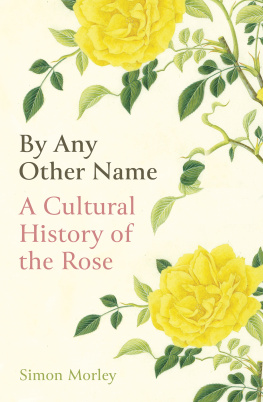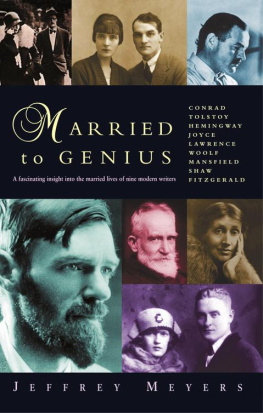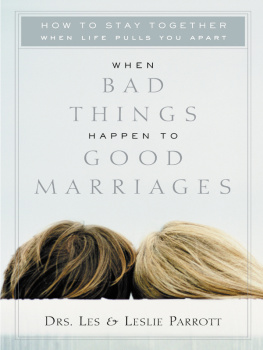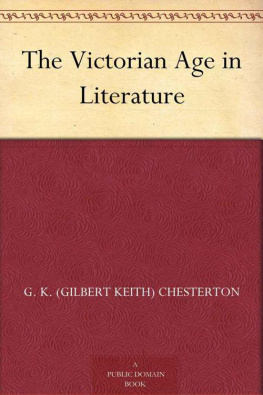Rose - Parallel lives: five Victorian marriages
Here you can read online Rose - Parallel lives: five Victorian marriages full text of the book (entire story) in english for free. Download pdf and epub, get meaning, cover and reviews about this ebook. City: New York;Great Britain, year: 2010, publisher: Knopf Doubleday Publishing Group;Vintage Books, genre: Non-fiction. Description of the work, (preface) as well as reviews are available. Best literature library LitArk.com created for fans of good reading and offers a wide selection of genres:
Romance novel
Science fiction
Adventure
Detective
Science
History
Home and family
Prose
Art
Politics
Computer
Non-fiction
Religion
Business
Children
Humor
Choose a favorite category and find really read worthwhile books. Enjoy immersion in the world of imagination, feel the emotions of the characters or learn something new for yourself, make an fascinating discovery.

- Book:Parallel lives: five Victorian marriages
- Author:
- Publisher:Knopf Doubleday Publishing Group;Vintage Books
- Genre:
- Year:2010
- City:New York;Great Britain
- Rating:3 / 5
- Favourites:Add to favourites
- Your mark:
- 60
- 1
- 2
- 3
- 4
- 5
Parallel lives: five Victorian marriages: summary, description and annotation
We offer to read an annotation, description, summary or preface (depends on what the author of the book "Parallel lives: five Victorian marriages" wrote himself). If you haven't found the necessary information about the book — write in the comments, we will try to find it.
Parallel lives: five Victorian marriages — read online for free the complete book (whole text) full work
Below is the text of the book, divided by pages. System saving the place of the last page read, allows you to conveniently read the book "Parallel lives: five Victorian marriages" online for free, without having to search again every time where you left off. Put a bookmark, and you can go to the page where you finished reading at any time.
Font size:
Interval:
Bookmark:
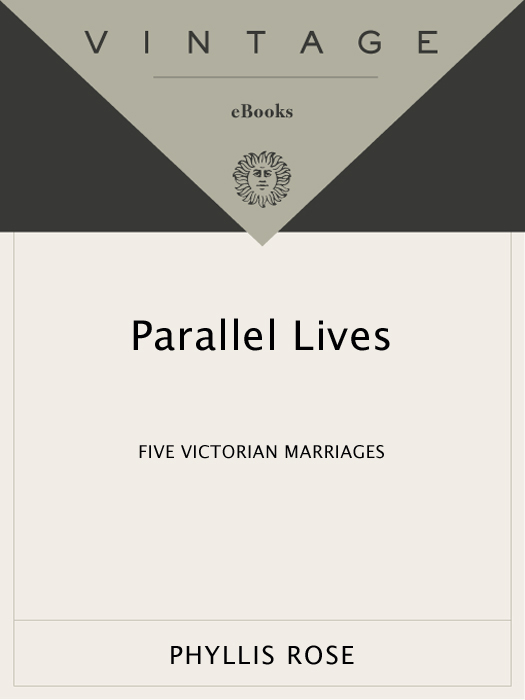
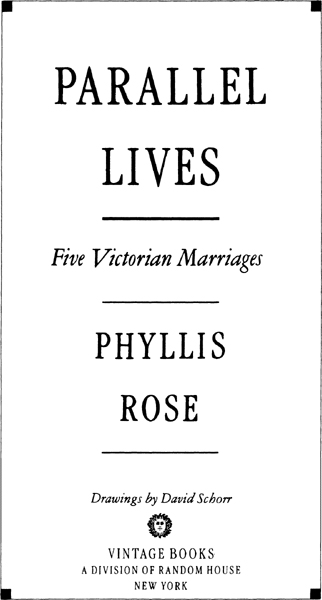
To
D. S.
Marriage affords great collective excitations: if we managed to suppress the Oedipus complex and marriage, what would be left for us to tell?
ROLAND BARTHES , Roland Barthes
My biggest debt is to the scholars, living and dead, who have made the private writings of the great Victorians available to us. I could not have considered doing a book such as this one if the biographical materials on which I base my own writing had still to be sought, found, deciphered, catalogued, indexed, footnoted, and printed, or if fine biographies of the people I write about did not already exist. The publication of correspondences and collected papers and the writing of authoritative biographies depend upon the labors of so many people that I will merely touch the tip of Leviathan in naming a dozen names, but in doing so I will at least signify my gratitude to the whole enterprise of biographical scholarship. For the Carlyles: Carlyle himself; J. A. Froude; and the editors of the ongoing Duke-Edinburgh Edition of The Collected Letters of Thomas and Jane Welsh Carlyle, including Charles Richard Sanders, Kenneth J. Fielding, Ian Campbell, John Clubbe, and Aileen Christianson. For the Ruskins: supremely, Mary Lutyens. For Dickens: John Forster; Ada Nisbet; Walter Dexter; and the editors of the Pilgrim Edition of Dickenss letters, in progress, Madeline House, Graham Storey, Kathleen Tillotson, and (again) K. J. Fielding. For Mill: Michael St. John Packe; F. A. Hayek; and the editors of Mills collected letters, Francis E. Minetka and Dwight N. Lindley. For George Eliot: Gordon Haight, with particular warmth. In a more general way, I owe thanks to Diane Johnson for the inspiration provided by her biography of Mary Ellen Peacock, the first Mrs. Meredith.
Friends who have helped me by reading and commenting on various parts of the manuscript include Paul Alpers, Svetlana Alpers, Georges Borchardt, Catherine Gallagher, Leslie Garis, William I. Miller, Richard Ohmann, Iris Slotkin, and Alex Zwerdling. Bryan Fuermann helped me with research, and Henry Abelove has left genial tracks of his learning throughout the book. Joseph W. Reed has read my manuscripts for longer and at earlier stages than anyone else, and for that alone he deserves special thanks. Moreover, his encouragement of this project was crucial. I also want especially to thank Annie Dillard for precious gifts of time, friendship, intelligence, and candor. Another friend, Nancy Nicholas, is also my editoras excellent a friend as an editor and dazzlingly graceful at juggling the two roles.
For many kinds of support, I am grateful to the faculty, staff, students, and administration of Wesleyan University.
I wish I wrote books faster so I could more often have the pleasure of recording in print my gratitude to Teddy Rose. This time I want to thank him particularly for teaching mewith the help of his Atarihow to overcome obstacles either by speeding up to go round them or by blasting them out of the way. Thanks, too, to Danny Dries and to David Schorr for the happiness of the past ten years.
When Leslie Stephen, the Victorian man of letters, read Froudes biography of Carlyle in the early 1880s, he was shockedas were many peopleby its portrait of the Carlyles marriage. He asked himself if he had treated his wife as badly as it seemed to him that Thomas Carlyle had treated Jane. With the Carlyles in his mind, Stephen, after his wifes death, enshrined his self-exoneration in a lugubrious record of his domestic life which posterity has dubbed The Mausoleum Book and I, reading it, conceived the idea for this book. Froudes life of Carlyle is a masterpiece, but much biography shares its power to inspire comparison. Have I lived that way? Do I want to live that way? Could I make myself live that way if I wanted to? Nineteenth-century Englishmen read Plutarchs Parallel Lives of the Greeks and Romans to learn about the perils and pitfalls of public life, but it occurred to me that there was no equivalent or even vaguely similar series of domestic portraits.
So this book began with a desire to tell the stories of some marriages as unsentimentally as possible, with attention to the shifting tides of power between a man and a woman joined, presumably, for life. My purposes were partly feminist (since marriage is so often the context within which a woman works out her destiny, it has always been an object of feminist scrutiny) and partly, in ways I shall explain, literary.
I believe, first of all, that living is an act of creativity and that, at certain moments of our lives, our creative imaginations are more conspicuously demanded than at others. At certain moments, the need to decide upon the story of our own lives becomes particularly pressingwhen we choose a mate, for example, or embark upon a career. Decisions like that make sense, retroactively, of the past and project a meaning onto the future, knit past and future together, and create, suspended between the two, the present. Questions we have all asked of ourselves such as Why am I doing this? or the even more basic What am I doing? suggest the way in which living forces us to look for and forces us to find a design within the primal stew of data which is our daily experience. There is a kind of arranging and telling and choosing of detailof narration, in shortwhich we must do so that one day will prepare for the next day, one week prepare for the next week. In some way we all decide when we have grown up and what event will symbolize for us that state of maturityleaving home, getting married, becoming a parent, losing our parents, making a million, writing a book. To the extent that we impose some narrative form onto our lives, each of us in the ordinary process of living is a fitful novelist, and the biographer is a literary critic.
Marriages, or parallel lives as I have chosen to call them, hold a particular fascination for the biographer-critic because they set two imaginations to work constructing narratives about experience presumed to be the same for both. In using the word parallel, however, I hope to call attention to the gap between the narrative lines as well as to their similarity.
An older school of literary biography was concerned to show how life had influenced an authors work. My own assumption is that certain imaginative patternscall them mythologies or ideologiesdetermine the shape of a writers life as well as his or her work. I therefore look for connections between the two without assuming that reality is the template for fictionassuming, if anything, the reverse. In first approaching this material, I looked for evidence that what people read helped form their views of their own experience. Some emerged. Jane Welsh, for example, being courted by Thomas Carlyle, derived her view of their relationship from reading La Nouvelle Hlose. Dickenss management of his separation from his wife seemed influenced by the melodramas in which he was fond of acting. But what came to interest me more was the way in which every marriage was a narrative constructor two narrative constructs. In unhappy marriages, for example, I see two versions of reality rather than two people in conflict. I see a struggle for imaginative dominance going on. Happy marriages seem to me those in which the two partners agree on the scenario they are enacting, even if, as was the case with Mr. and Mrs. Mill, their own idea of their relationship is totally at variance with the facts. I speak with great trepidation about facts in such matters, but, speaking loosely, the facts in the Mills casethat a woman of strong and uncomplicated will dominated a guilt-ridden manwere less important than their shared imaginative view of the facts, that their marriage fitted their shared ideal of a marriage of equals. I assume, then, as little objective truth as possible about these parallel lives, for every marriage seems to me a subjectivist fiction with two points of view often deeply in conflict, sometimes fortuitously congruent.
Font size:
Interval:
Bookmark:
Similar books «Parallel lives: five Victorian marriages»
Look at similar books to Parallel lives: five Victorian marriages. We have selected literature similar in name and meaning in the hope of providing readers with more options to find new, interesting, not yet read works.
Discussion, reviews of the book Parallel lives: five Victorian marriages and just readers' own opinions. Leave your comments, write what you think about the work, its meaning or the main characters. Specify what exactly you liked and what you didn't like, and why you think so.

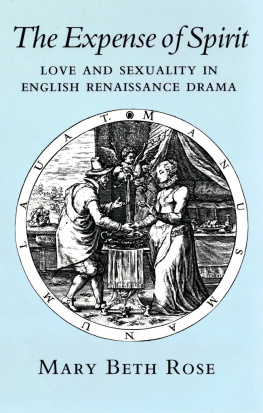
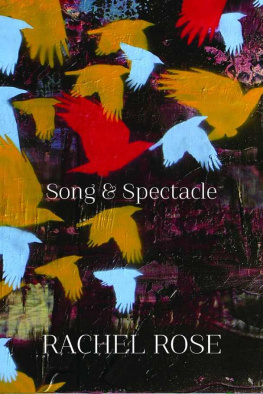
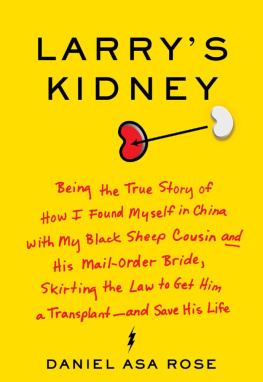
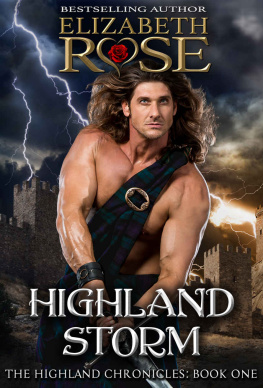
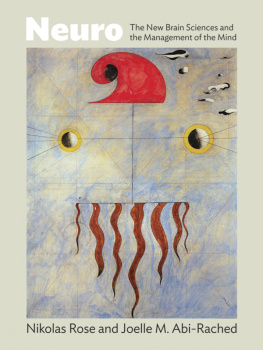
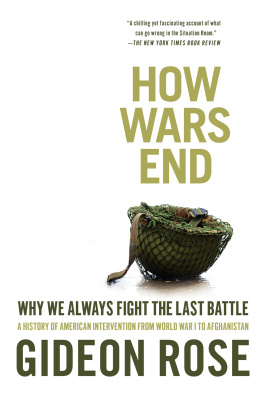
![Margaret Millar - Rose's Last Summer [= The Lively Corpse]](/uploads/posts/book/899392/thumbs/margaret-millar-rose-s-last-summer-the-lively.jpg)
